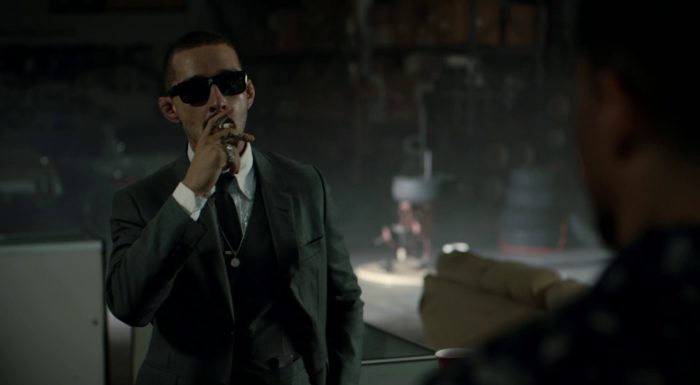
Film Review: The Tax Collector
Written, produced, and directed by David Ayer. US, 2020, 95 minutes.
Available on video-on-demand platforms.
Ayer’s latest South Central crime drama has been criticized for the filmmaker’s decision to cast Shia LaBeouf in a lead role against an otherwise entirely Latinx cast, and the film’s trailer didn’t assuage fears of brownface. The director has pushed back, insisting that LaBeouf’s character isn’t meant to be Latino despite his jarring Chicano inflection. But what ails The Tax Collector runs far deeper than this sole controversy. It’s a puddle of a film, without shape or clear purpose. A strong supporting cast and a handful of provocatively gruesome action sequences can’t save the poorly-paced movie from Ayer’s worst instincts: A reliance on macho moralism, uninspired visual language, and broad, often racist stereotypes.
The collectors in question are David (Bobby Soto) and Creeper (LaBeouf), who do work on behalf of incarcerated crime lord Wizard (a cameo revealed in the movie’s final minutes). They drive around Los Angeles bickering with one another, intimidating or threatening others, and collecting Wizard’s sizable cut from local businesses and gangs. David is a family man, with a wife Alexis (Cinthya Carmona), two kids, and Jesus on the cross waiting for him back at home. Creeper is a health nut and an atheist who makes jokes about TED Talks and seems to run on bloodlust. They’re nothing alike, but they’re old pals—that’s all we really get from their relationship. What, if anything, is keeping these two men together? Creeper’s big cauliflower ears and facial scars shout backstory, but we never get any explanation, odd considering how didactic the rest of the script leans.
Despite Ayer’s very public insistence that Creeper isn’t the main character, LaBeouf pulls focus and looms oddly over the film without contributing to its emotional stakes—a caricature that isn’t charismatic enough to steal the show. Soto gives a more valuable performance as David, but Ayer’s one-dimensional characterization of him as a self-deluded criminal fighting for his family—always speaking bland, thematically-motivated lines like “I love my family. I love God.”—leaves little room for actorly nuance.

Visually, the film is flat and unmemorable. The handheld effect Ayer deployed in End of Watch (2012) is nowhere to be found—instead The Tax Collector is close-up-heavy, with little style or flourish. Save for the immersive underwater nightmare sequence that opens the film, no scenes nor individual shots stand out from the rest.
Considering Ayer’s proclivities, what’s oddest about The Tax Collector is the remarkable lack of action for most of the movie—a gun doesn’t even go off until about one hour in, the film spending huge portions of its runtime just establishing and explaining its milieu instead. In other hands, that choice might lead somewhere purposeful or meditative, but here it feels almost accidental, with a rushed and bloody conclusion (including a bonkers Satanic human sacrifice) that fails to connect with the rest of the film’s more workaday focus.
Unlike Fury (2014), Ayer’s gore-laden flick about an American tank crew in Nazi Germany, the ultimate bloodletting in The Tax Collector doesn’t seem to be saying much of anything, not even on its directly-acknowledged subjects like the cognitive dissonance of religion and the futility of violence. Ayer seems to think the pain happening in The Tax Collector is merely the price that its characters must pay for getting to live some cool, dangerous life. The entire movie feels morally and narratively transactional—but without convincing drama, action, or intrigue, The Tax Collector doesn’t pay off. [★½]
Country Music Concerts Near Me
How To Watch NBA Live Streaming
Cassidy Olsen is a film critic, culture journalist and screenwriter based in Dublin, Ireland.

